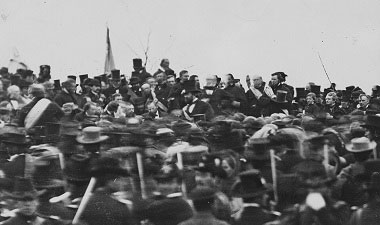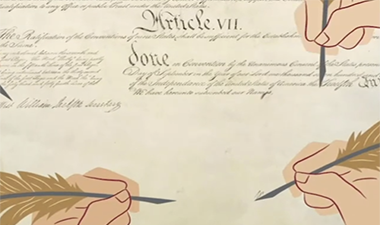On July 4, 1821, then-Secretary of State John Quincy Adams, future President and son of John Adams, was invited to deliver a speech to the U.S. House of Representatives celebrating the 45th anniversary of the Declaration of Independence.
Brief Explanation
On July 4, 1821, then-Secretary of State John Quincy Adams, future President and son of John Adams, was invited to deliver a speech to the U.S. House of Representatives celebrating the 45th anniversary of the Declaration of Independence—a document that his father had worked with Thomas Jefferson to help author. In this speech, Adams emphasized key principles at the core of the American Revolution, including liberty, republicanism, and government by consent. Interestingly, as the sitting Secretary of State and future author of the Monroe Doctrine, Adams also connected the Declaration of Independence to American foreign policy and a balanced vision of America’s role in the world—characterizing the United States as a champion of freedom both at home and abroad that nonetheless did not seek out “monsters to destroy.”
Excerpt
The Declaration of Independence in its primary purport was merely an occasional state-paper. It was a solemn exposition to the world, of the causes which compelled the people of a small portion of the British empire to cast off the allegiance and renounce the protection of the British king; and to dissolve their social connexion with the British people. In the annals of the human race, the separation of one people into two, is an event of no uncommon occurrence. The successful resistance of a people against oppression, to the downfall of the tyrant and of tyranny itself, is the lesson of many an age, and of almost every clime. It lives in the venerable records of Holy Writ. It beams in the brightest pages of profane history.
. . .
The interest, which in this paper has survived the occasion upon which it was issued; the interest which quicken with the lapse of years, spreads as it grows old, and brighten as it recedes, is in the principles which it proclaims. It was the first solemn declaration by anation of the onlylegitimatefoundation of civil government. It was the corner stone of anew fabric, destined to cover the surface of the globe. It demolished at astroke the lawfulness of all governments founded upon conquest. It swept away all the rubbish of accumulated centuries of servitude. It announced in practical form to the world the transcendent truth of the unalienable sovereignty of the people. It proved that the social compact was no figment of the imagination; but areal, solid, and sacred bond of the social union. From the day of this declaration, the people of North America were no longer the fragment of adistant empire, imploring justice and mercy from an inexorable master in another hemisphere. They were no longer children appealing in vain to the sympathies of aheartless mother; no longer subjects leaning upon the shattered columns of royal promises, and invoking the faith of parchment to secure their rights. They were anation, asserting as of right, and maintaining by war, its own existence. Anation was born in aday.
. . .
It will be acted o’er, fellow-citizens, but it can never be repeated. It stands, and must forever stand alone, abeacon on the summit of the mountain, to which all the inhabitants of the earth may turn their eyes for agenial and saving light till time shall be lost in eternity, and this globe itself dissolve, nor leave awreck behind. It stands for ever, alight of admonition to the rulers of men; alight of salvation and redemption to the oppressed. So long as this planet shall be inhabited by human beings, so long as man shall be of social nature, so long as government shall be necessary to the great moral purposes of society, and so long as it shall be abused to the purposes of oppression, so long shall this declaration hold out to the sovereign and to the subject the extent and boundaries of their respective rights and duties, founded in the laws of nature, and of nature’s God.
. . .
And now, friends and countrymen, if the wise and learned philosophers of the elder world; the first observers of the mutation and aberration, the discoverers of maddening ether and invisible planets, the inventors of Congreve rockets and shrapnel shells, should find their hearts disposed to inquire, what has America done for the benefit of mankind? Let our answer be this: America, with the same voice which spoke herself into existence as anation, proclaimed to mankind the inextinguishable rights of human nature, and the only lawful foundations of government. America, in the assembly of nations, since her admission among them, has invariably, though often fruitlessly, held forth to them the hand of honest friendship, of equal freedom, of generous reciprocity. She has uniformly spoken among them, though often to heedless and often to disdainful ears, the language of equal liberty, of equal justice, and of equal rights. She has, in the lapse of nearly half acentury, without asingle exception, respected the independence of other nations, while asserting and maintaining her own. She has abstained from intereference in the concerns of others, even when the conflict has been for principles to which she clings, as to the last vital drop that visits the heart. She has seen that probably for centuries to come, all the contests of that Aceldama, the European World, will be contests between inveterate power, and emerging right. Wherever the standard of freedom and Independence has been or shall be unfurled, there will her heart, her benedictions and her prayers be. But she goes not abroad, in search of monsters to destroy. She is the well-wisher to the freedom and independence of all. She is the champion and vindicator only of her own. She will recommend the general cause, by the countenance of her voice, and the benignant sympathy of her example. She well knows that by once enlisting under other banners than her own, were they even the banners of foreign Independence, she would involve herself, beyond the power of extrication, in all the wars of interest and intrigue, of individual avarice, envy, and ambition, which assume the colors and usurp the standard of freedom. The fundamental maxims of her policy would insensibly change from liberty to force. The frontlet upon her brows would no longer beam with the ineffable splendor of Freedom and Independence; but in its stead would soon be substituted an Imperial Diadem, flashing in false and tarnished lustre the murkey radiance of dominion and power. She might become dictatress of the world. She would be no longer the ruler in her own spirit.
My Countrymen, Fellow-citizen, and Friends; could that spirit, which dictated the Declaration we have this day read; that Spirit, which “prefers before all temples the upright heart and pure,” at this moment descend from his habitation in the skies, and within this Hall, in language audible to mortal ears, address each one of us, here assembled, our beloved country, Britannia ruler of the waves, and every individual among the sceptred lords of human kind; his words would be, “Go thou and do likewise!”







